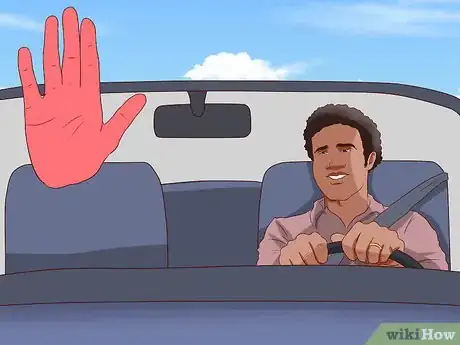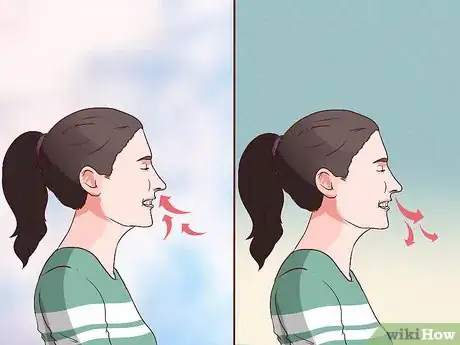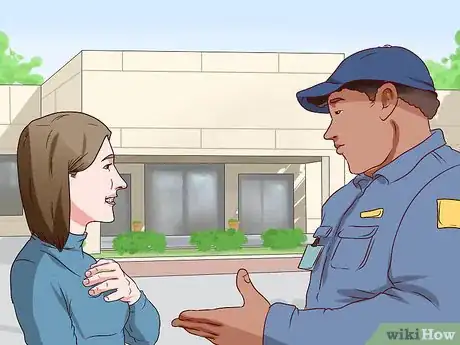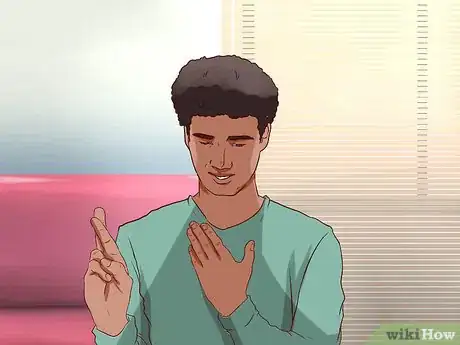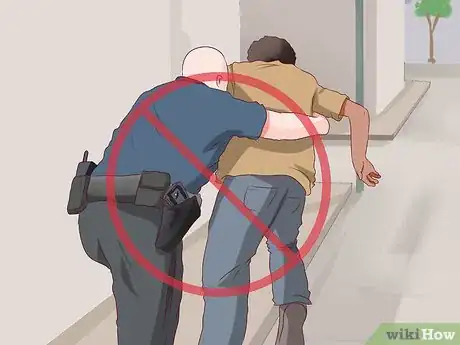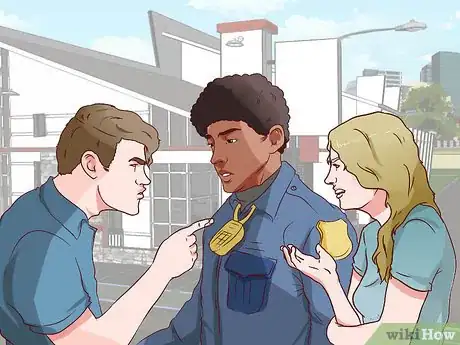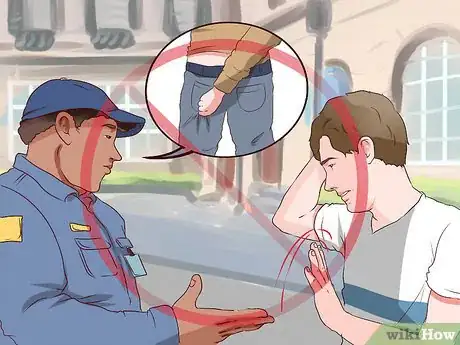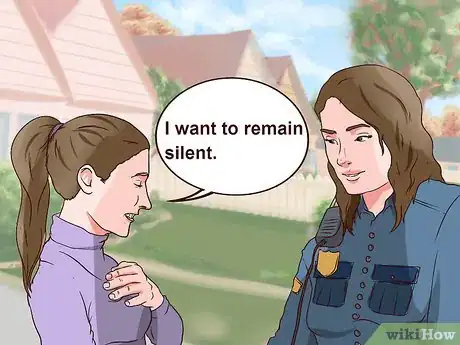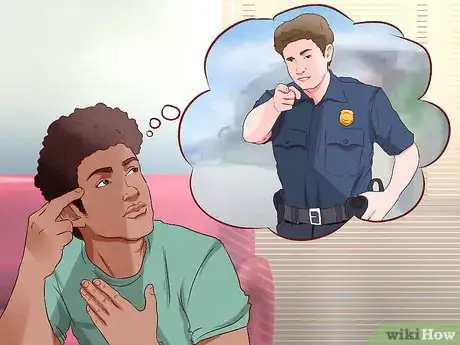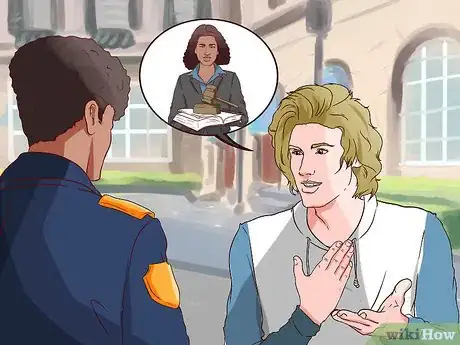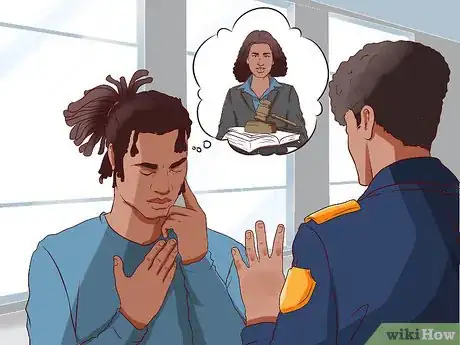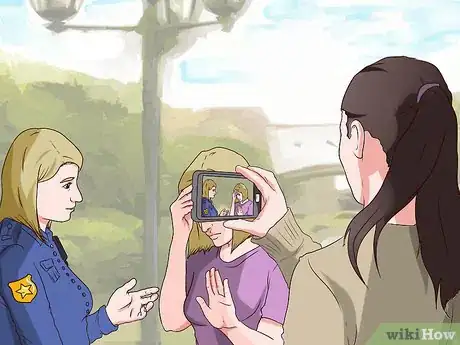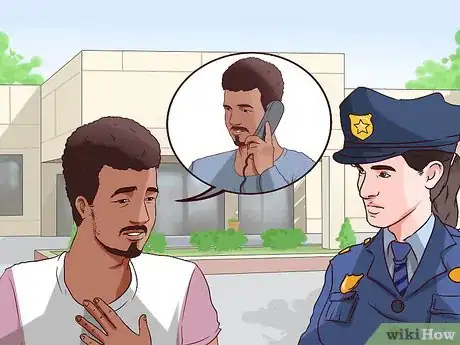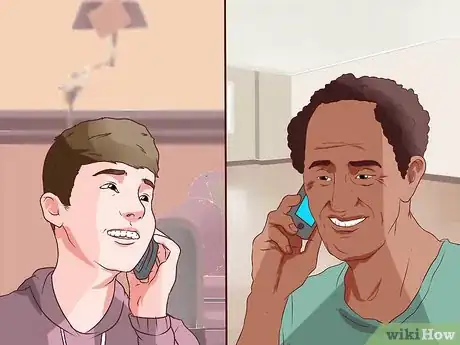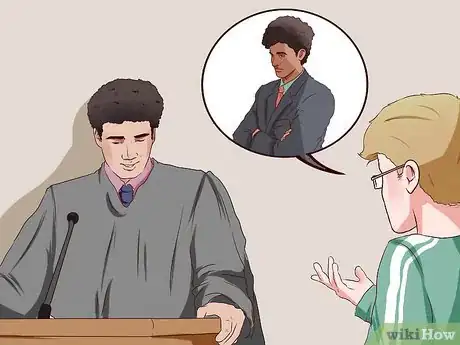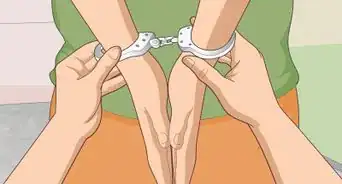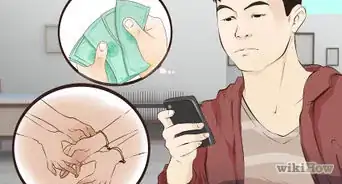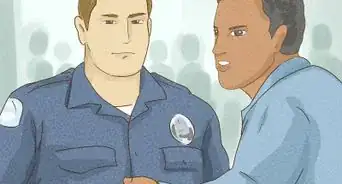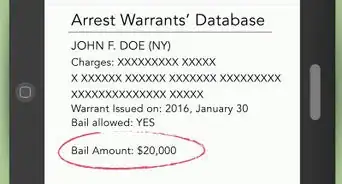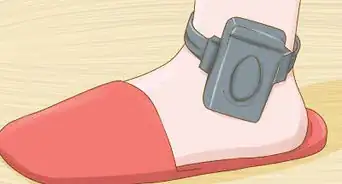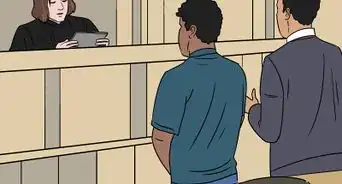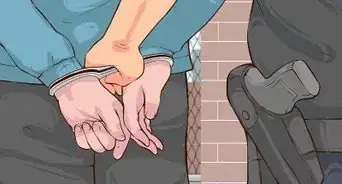This article was co-authored by Clinton M. Sandvick, JD, PhD. Clinton M. Sandvick worked as a civil litigator in California for over 7 years. He received his JD from the University of Wisconsin-Madison in 1998 and his PhD in American History from the University of Oregon in 2013.
There are 8 references cited in this article, which can be found at the bottom of the page.
This article has been viewed 24,788 times.
Police encounters can be intense. You may feel that you have been unfairly arrested. However, in order to avoid any negative consequences, you need to stay calm and in control of yourself during the encounter. You will be better off if you show respect to the police, even if you don’t think they deserve it. At the same time, you should be focused on protecting your rights, such as the right to remain silent. Once you are taken to the station and booked, you should work on getting a phone call so that you can hire an attorney.
Steps
Behaving Respectfully
-
1Stop a moving vehicle immediately. It is common to be stopped while driving. If you see the lights blinking in your rearview mirror, then you should remember the following tips:[1]
- Pull over to a safe place as soon as possible. You don’t have to stop the car on a dangerous part of the road, but pull over as soon as you see a safe spot and turn off your car.
- Turn on your internal light. This will make the officer more comfortable to approach your car.
- Open the window a crack. Don’t open the door, since that looks like you’re getting out to confront the officer. But put down your window several inches.
- Put your hands on the steering wheel so that the officer can see them when she or he approaches your window.
- Tell the officer where your registration is located, and ask if you can get it: “That’s in my glove compartment box. Can I get it?”
-
2Stay calm. It is natural for your heart to start pounding when you get arrested—especially if you’ve done nothing wrong. However, it is important to remain calm.[2] By raising your voice or getting angry, you could trigger the police to become angry in return.
- To calm yourself, take a deep breath and hold it for a couple of seconds. Then slowly release the air. Take another deep breath.
Advertisement -
3Speak politely. You shouldn’t swear or cuss out the officer, no matter how angry you feel.[3] Always say “Sir,” “Ma’am,” or “Officer” when speaking to the police. It is safer to be too polite than not polite enough.
-
4Tell the truth. Unfortunately, you can escalate a situation by lying to the police or pretending to be dumb. Although you don’t have to speak to the police, you shouldn’t lie to them if you do.[4]
- Also don’t think that you can get out of an arrest by faking a panic attack or another medical emergency. This will only prolong the amount of time that you stay in police custody.
-
5Don’t physically resist. In addition to remaining polite and staying calm, you should not physically resist the arrest. It is very dumb to resist, even if you're innocent, you should let the officer arrest you to avoid giving the prosecutor another reason to charge you. Should you decide to resist, you will make the officer angrier so they will ask you or request help from their fellow officers to get you in custody.[5] When the police tell you that you are under arrest, you should not fight them as they place handcuffs on you.
- Instead, you should follow their directions. If the police tell you to turn around, then turn around.
- If the police are hurting you, then tell them: “That hurts” or “The handcuffs are too tight.” However, you should avoid pulling your hands away or physically resisting, even if you feel some pain.
-
6Avoid confrontations with other arrestees. You might be arrested as part of a group. For example, you might have participated in a protest and been picked up with a group of other people who you might not know really well. It is important not to get into fights with them as you sit in jail.[6]
- Don’t fight over space (“I was sitting there!”) or about who gets to use the phone first. Instead, try to remain as polite as possible.
- You also shouldn’t talk about the incident with them. Anything you say to anybody can later be used against you. Accordingly, whatever you say to other arrestees in jail or in the back of the police car could come out at trial.
Protecting Your Rights
-
1Avoid consenting to a search. The police can perform a pat down if they have “reasonable suspicion” that you have a weapon on you. They may also search your vehicle if they arrest you or if they have “probable cause” that your car contains evidence of a crime.[7] However, the police often try to get you to consent to a search.
- If you consent, then the police don’t need any sort of suspicion or probable cause. For this reason, you should not consent to the search of your vehicle or belongings.[8]
- If the officer asks, “Can I look in your trunk?” then you need to politely say, “I don’t give you permission, officer.”
-
2State you want to remain silent. You have to answer some basic questions. For example, you have to identify yourself and your address. You also have to show your photo identification, if you have it on you.[9] However, you are not constitutionally required to answer any other questions the police might ask.
- You must tell the police you want to remain silent to invoke that right.
- Sometimes, police don’t like it when you know the law. Unfortunately, you may be escalating the situation by telling the police you want to be quiet. Nevertheless, silence is so important that you need to run the risk of the officer getting angry with you.
-
3Do not talk to the police without your lawyer. If the police ask you questions, do not answer any of them, only say "I want a lawyer". You should only provide information to your lawyer because they will help get you out of trouble, the police only want the information to use against you in court. If you cannot afford a lawyer, the government must provide you with one at no charge. If you decide to talk to the police without a lawyer, be aware the police can legally lie to you to obtain incriminating statements. It is illegal to lie to the police, but it is not illegal to decline to answer questions. Once you ask for a lawyer, the police must leave you alone and stop all questioning.
- Police may tell you that you don't need a lawyer or that hiring one would make you appear guilty, but they are lying. Even police officers advise their loved ones to ask for a lawyer if arrested, and you should too. Don't let them make you feel guilty for protecting your rights.
- Never sign anything the police ask you to sign. If they ask you to sign something, say: "I refuse to sign this without my attorney present." Only sign that form if your attorney confirms it's safe to do so.
- If you're innocent, don't talk to the police. You cannot convince them of your innocence, and they may twist your words to make you appear guilty.
- If you did commit a crime, do not talk to the police. In order for you to be convicted, the prosecutor must prove "beyond a reasonable doubt" that you're guilty. Not talking to the police increases your chances of winning in court while talking to them, depending on how much information you gave them, will only make it very hard or impossible to win.
- The interrogator is trained to obtain confessions using the Reid Technique which is infamously known for getting innocent people wrongly convicted or even executed for a crime they did not commit. The officer may lie:
- The camera is turned off so it's safe to make incriminating statements.
- Your friend told them everything and want to hear your side of the story.
- If you talk to them, the sooner you will go home.
- If you talk to them, your sentencing will go easier or they'll drop the charges.
- Someone saw what you did and told them, they may make the person up.
- Using fake evidence that makes you seem guilty.
- You failed the lie detector test despite the results show you told the truth.
- They saw you on footage doing the crime.
- They are on your side or are your friend and trying to help you.
- That asking for a lawyer is an admission of guilt.
-
4Ask for an attorney. Once you are arrested, state that you want to talk to a lawyer. State clearly, “I want to talk to my lawyer.”[10] Once you request an attorney, the interrogation must end. Under the constitution, you have the right to be represented by an attorney, if you cannot afford an attorney, the state is obligated to provide you with a public defender for free. Alternatively, you can represent yourself, but this is guaranteed to lead to a conviction for the following reasons:
- The prosecutor is a lawyer. They know how to direct or cross-examine witnesses, introduce evidence, make objections, and select a jury. It is highly unlikely that you possess any of these skills.
- The judge cannot help you. The judge may be generous to advise you on your constitutional rights, but anything beyond that is illegal.
- The law is very complicated. Going to court without representation is equivalent to performing your own surgery without the help of a medical doctor.
-
5Remember everything. As soon as you are stopped by the police, you should be trying to build a defense. For example, you should remember as best as you can what the officer said and what you said in return. Remember these details so that you can tell your lawyer later. Also remember the following:
- Were you told you had the right to remain silent before being questioned? Were you also told you had the right to an attorney? If not, then you can probably get anything you say thrown out of court.
- Did the officer show you a warrant when they came to your home to arrest you? If not, then the arrest may be unconstitutional.
- Did you consent to any search? Be honest with your lawyer. If you consented, then you have limited defenses.
- Were the police rough with you? For example, the police might have sent a dog to bite and hold you without giving you a warning. Or the police might have put you in a choke hold although you weren’t resisting. Remember these details and tell your lawyer about the force the police used against you. You might be able to file a written complaint later.[11]
-
6Film the encounter, if you want. You have a constitutional right to film an encounter with police provided it happens in a public place.[12] Although some states have tried to make it illegal to videotape police on the street, courts keep striking these laws down.
- However, you must always judge protecting your rights against how angry you might be making the police. Some officers could get aggressive if they don’t want to be video recorded. You have to balance preserving evidence against the need to defuse the situation.
- An alternative to filming is to ask bystanders to take down important information, like the squad car number and the names or descriptions of the officers. These bystanders could be important witnesses in the future.
Requesting an Attorney
-
1Ask to call a lawyer. Each jail has its own procedures for allowing you to make a phone call. You might need a quarter to call at a pay phone. If you don’t have any money, then tell the person in charge.
- The booking process varies at each jail. You don’t have the right to an immediate phone call, so don’t start throwing your weight around by yelling, “I have the right to a phone call!” In fact, if you are aggressive with the police, they might delay your ability to call an attorney.[13]
- Wait to be booked and then ask, “Can I make a phone call now?”
- Also be persistent. The police might process you then forget about you. You might have to ask the officer more than once. Always be polite: “I haven’t had a chance to make my phone call, officer. Can I call now?”
-
2Call a friend or family member. Once you get to make a phone call, call someone you know will be home or know will answer their cell phone. This should be a responsible adult, such as a parent or grandparent, and not a friend who might be out partying.
- In some departments, the police might actually make the call for you. Give them the name and phone number of who you want to call. Police make the call for you so that you don’t contact someone and instruct them to destroy evidence or flee the police.
- If you can’t reach anyone on your first call, ask if you can make another. Police have discretion, and generally they will let you make as many calls as you need, provided you are not abusing the privilege.[14]
- Line up your attorney first. This is your top priority. You can ask to make other phone calls—e.g., to your boss (to tell them you’ll miss work) or to arrange day care—but make sure to get a lawyer first.
-
3Request a public defender at your initial appearance. After being booked, you may be taken before a judge within 24 hours. This is typically called an “initial appearance.” The judge should ask you whether you can afford an attorney or if you want a public defender. Tell the judge you want a public defender.
- You will probably have to complete an application to request a public defender. This application will request personal information, such as your monthly income and assets (bank accounts, life insurance, real estate).
Warnings
- This article is for general information only. It is not meant to provide legal advice.⧼thumbs_response⧽
References
- ↑ https://www.aclu.org/know-your-rights/what-do-if-youre-stopped-police-immigration-agents-or-fbi
- ↑ https://www.aclu.org/know-your-rights/what-do-if-youre-stopped-police-immigration-agents-or-fbi
- ↑ http://www.thewire.com/national/2012/04/proper-etiquette-when-youre-under-arrest/50800/
- ↑ https://www.aclu.org/know-your-rights/what-do-if-youre-stopped-police-immigration-agents-or-fbi
- ↑ https://www.aclu.org/know-your-rights/what-do-if-youre-stopped-police-immigration-agents-or-fbi
- ↑ http://www.thewire.com/national/2012/04/proper-etiquette-when-youre-under-arrest/50800/
- ↑ http://criminal.findlaw.com/criminal-rights/can-the-police-legitimately-search-my-vehicle-without-a-warrant.html
- ↑ https://www.aclu.org/know-your-rights/what-do-if-youre-stopped-police-immigration-agents-or-fbi
- ↑ http://www.thewire.com/national/2012/04/proper-etiquette-when-youre-under-arrest/50800/
- ↑ https://www.aclu.org/know-your-rights/stopped-by-police/
- ↑ https://www.aclu.org/know-your-rights/what-do-if-youre-stopped-police-immigration-agents-or-fbi
- ↑ http://www.theatlantic.com/technology/archive/2015/04/what-to-say-when-the-police-tell-you-to-stop-filming-them/391610/
- ↑ http://www.todayifoundout.com/index.php/2014/05/really-entitled-phonecall-arrested/
- ↑ http://www.todayifoundout.com/index.php/2014/05/really-entitled-phonecall-arrested/
